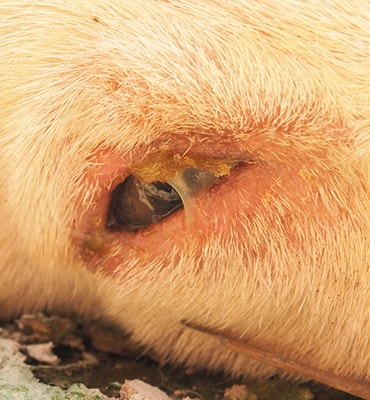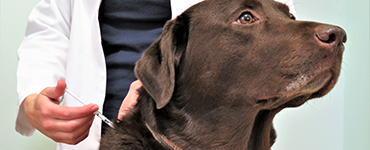Distemper in dogs
Overview
- Distemper is a nasty virus that causes a wide range of symptoms including a cough, runny eyes and nose, diarrhoea, high temperature, thickened pads, tremors and fits.
- Distemper spreads in the air, through contact with infected dogs and on items they have touched.
- Distemper is a very serious illness that is sadly, often fatal.
- Vaccination has meant we now rarely see distemper in the UK, but it does still occur, especially in areas with lots of unvaccinated dogs.
- Vaccination is the best way to protect your dog from distemper.
What is distemper?
Distemper is a nasty virus that attacks several different organs in the body including the guts, heart, immune system, lungs, brain and nerves. Distemper causes a variety of symptoms ranging from mild cold-like signs to seizures and death. It spreads in air, bodily fluids (such as urine and saliva), and can live in the environment where an infected dog has been. Young, unvaccinated dogs are most at risk.
Symptoms
Symptoms of distemper vary a lot, depending which organs are affected and how much resistance (immunity) a dog has. Dogs can show any combination of the following symptoms:
- High temperature (fever)
- Runny eyes and nose (first watery then pussy)
- Low energy (lethargy)
- Loss of appetite
- Diarrhoea
- Thickened paw pads and nose (hard pad)
- Coughing
- Tremors
- Paralysis
- Fits and seizures.
Distemper often starts by causing runny eyes, a cough, and diarrhoea, then after 3-4 weeks starts to cause hard pads, a hard nose and neurological signs (fits, tremors and seizures).

Distemper virus causing weepy eyes in a dog
Outlook
It’s impossible to say whether your dog will survive distemper. Some dogs die during the early stages, some become so poorly that they need to be put to sleep, some are left with permanent brain damage and some are poorly for several weeks, but eventually recover.
Vaccination
In the UK distemper is much rarer than it used to be, but unvaccinated dogs are still at risk. Fortunately, it’s easy to prevent by vaccinating puppies before they are let out into public/allowed to mix with other dogs, and by giving adult dogs booster vaccinations throughout their life.

Vaccinate your dog against distemper
Cost
Treatment for distemper can become very expensive. Bills can mount into hundred, if not thousands of pounds if your dog requires a long stay in a veterinary hospital and ongoing care. It’s very important to speak openly to your vet about your finances, the cost of treatment, as well as what you think is right for your dog. There might be more than one treatment option, so if one doesn’t work for you and your pet then the vet may be able to offer another.
When you welcome a new dog into your life, consider getting dog insurance straight away before any signs of illness start. This will give you peace of mind that you have some financial support if they ever get sick.
Taking an unvaccinated puppy outside
An unvaccinated puppy, or a puppy that has only had their first injection has no protection against distemper or the other diseases we vaccinate against. Your puppy will be safe to go out for a walk and meet other dogs one-two weeks after they complete their first vaccination course. Until then:
- Home and garden. Your puppy is safe to go into your garden as long as no unvaccinated dogs have visited recently.
- Public places. You can take your puppy out into public but make sure you carry them and don’t put them down onto the ground
- Puppy classes. As long as your puppy is healthy it’s okay to enrol them in a puppy class. The benefits far outweigh the very small risk of catching distemper from another puppy.
Published: April 2020
Did you find this page useful?
Tell us more
Please note, our vets and nurses are unable to respond to questions via this form. If you are concerned about your pet’s health, please contact your vet directly.
Thank you for your feedback
Want to hear more about PDSA and get pet care tips from our vet experts?
Sign up to our e-newsletter
Written by vets and vet nurses. This advice is for UK pets only. Illustrations by Samantha Elmhurst.

